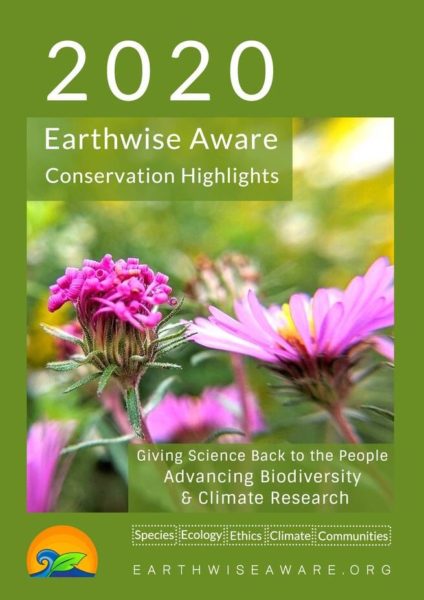A guest post by Anita Brewer-Siljeholm
Did you visit the Fells in 2020 to flee the confinements of Covid-19? If so, you likely saw more people, pets and cars than ever before, and you might have wondered how Nature is holding up in the reservation.
A major citizen science research program has begun to collect the data to answer this question and others. Partnering with the Friends of the Fells, Earthwise Aware (EwA) naturalists and citizen scientists have just completed their second full year of field work in the Fells. The result is summarized in several wonderful digital reports now available online.

For a colorful summary of the year’s work, see the 2020 EwA Conservation Highlights. For a deeper dive, see the full 2020 EwA Conservation Report here. Vernal pools are a special focus of EwA research in the Fells, so a 2020 EwA Vernal Pool Report describes EwA research to successfully document a number of overlooked vernal pools, which is the first step toward better protection for these exceptional habitats.
Historically, having a place to study natural history in a rugged and varied landscape so close to Boston was one reason why citizens in the late 1800’s argued to set aside the woodland. They recognized too that a growing urban population badly needed the tranquility of Nature, with its deep woods, secluded ponds and stony hilltops, just as people today seek the Fells. Fortunately for us, their 25-year campaign succeeded in protecting from development the woods they loved.
2020 was a busy year for citizen science research! Despite pandemic-related constraints, EwA naturalists and volunteers logged over 1,100 hours at multiple research sites. These covered individual trees and patches including red maple, oak, American chestnut, sassafras and witch hazel species; flowering plants such as Indian cucumber; shrubs such as sweet pepperbush; and vernal pools.
EwA citizen scientists return throughout the year to monitor phenological changes, arthropod activity, bird movements, plant communities and general biodiversity. The goal is to document, photograph, record and upload data to the National Phenology Network and other local and national studies. EwA uses online data platforms including Nature’s Notebook, Caterpillars Count, iNaturalist, and Massachusetts-specific databases.
Earthwise Aware also launched a new research project in 2020: to document bio-pollution in the Fells, aka dog poop! Whether bagged or not, dog poop has contaminants that can harm wildlife. By creating maps through photo records of dog poop left in the Fells, EwA assembles data that will help assess the effects of this contamination. That data is updated monthly and publicly accessible in Google Map. By late December over 1,200 visual records of abandoned dog feces had been submitted! Anyone can do this – just be sure your smart phone’s photo app is GPS-enabled. Click here to find out how to submit your photos.

In 2020, EwA also piloted a study to document habitat fragmentation in the Fells. This study will map the vast network of “rogue trails” which are often shortcuts through the woods. They are usually made by hikers and bikers going off trail, and the problem is that these unmarked trails damage sensitive habitat and reduce the amount of undisturbed forest floor that wildlife needs to survive in the Fells. These maps will guide conservation work in the reservation.
Citizens scientists have fun. In their spare time, on weekends or after hours, they learn to recognize and record the cycles of nature across the Fells, and share their own knowledge with their team. EwA helps people learn how to enter the woods as guests, with a clear ethic to not disturb nature while taking a very close look. For instance, an egg mass specimen in a vernal pool is photographed underwater, rather than lifting it out from the water column as researchers typically do.
Earthwise Aware is a non-profit group started in 2018 by Claire O’Neill, a former high tech data whiz and naturalist who saw the loss of biodiversity as the greatest planetary threat. Starting locally, she has focused on developing a growing band of volunteer citizen scientists and interns who collaborate on research and reporting. In 2019, Claire joined the Board of Directors of the Friends of the Fells.
To learn more about becoming a volunteer citizen scientist, click here. To join naturalists on their monthly public walks in the Fells, click here. You may be astonished at what you learn to see.
